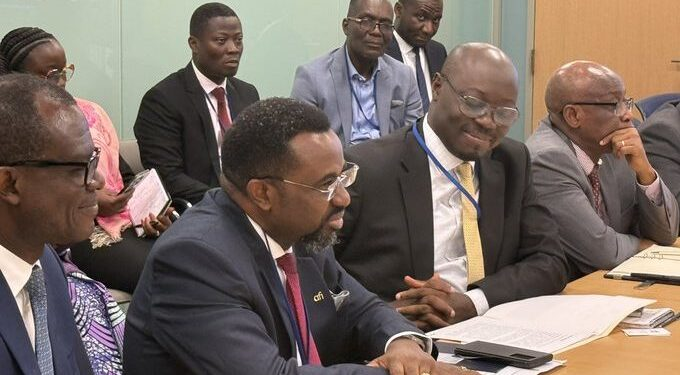Debt restructuring progresses smoothly as Ghana signs deals with 5 nations – IMF Report


Ghana’s debt restructuring has reached a major milestone as the country signed bilateral agreements with five creditor nations under the G20 Common Framework, the International Monetary Fund (IMF) has confirmed.
The IMF said the agreements mark significant progress in Ghana’s comprehensive debt restructuring efforts, which are key to restoring long-term debt sustainability and economic confidence.
The development follows the signing of a Memorandum of Understanding with the Official Creditor Committee earlier this year.
According to IMF Mission Chief Ruben Atoyan, “the comprehensive debt restructuring is progressing well. Following the signing of a Memorandum of Understanding with the Official Creditor Committee under the G20 Common Framework, bilateral agreements have been concluded with five countries.”
He added that Ghana is “actively engaging in negotiations with remaining commercial creditors to finalise debt treatments.”
The IMF noted that Ghana’s debt outlook has improved, supported by an upgraded macroeconomic forecast and continued fiscal discipline.
The Fund’s statement followed the conclusion of a two-week mission to Accra from September 29 to October 10, 2025, as part of the fifth review of Ghana’s three-year Extended Credit Facility program.
The programme, worth SDR 2.242 billion (about US$3.2 billion), was approved in May 2023 to help stabilise the economy and restore growth.
The IMF announced that it had reached a staff-level agreement with Ghana on the fifth review, pending approval by IMF management and the Executive Board.
Once approved, Ghana will access SDR 267.5 million (about US$385 million), bringing total disbursements to about US$2.8 billion since the programme began.
The Fund said macroeconomic stabilisation is “taking root,” with stronger-than-expected growth in the first half of 2025 driven by services and agriculture. Ghana’s external position also improved, backed by robust gold and cocoa exports and a stronger cedi.
“The positive momentum is expected to continue into 2026, with growth projected at 4.8 per cent,” Mr Atoyan said. Inflation is also forecast to stay within the Bank of Ghana’s target band, while reserves continue to rise above programme expectations.
The IMF commended Ghana for tackling long-standing energy sector challenges through renegotiated power purchase agreements and improved payments under the Cash Waterfall Mechanism.
Fiscal performance also remains strong, with a primary surplus of 1.1 per cent of GDP for the first eight months of 2025, putting the country on track to meet its 1.5 per cent target by year-end.
The IMF further confirmed that the Bank of Ghana has cut its policy rate by 650 basis points to 21.5 per cent as inflation falls toward the target.
The central bank has also developed a new framework for foreign exchange operations to smooth volatility and build reserves.
The Fund described Ghana’s progress as a “significant step toward long-term debt viability” and praised the government’s ongoing commitment to fiscal discipline, structural reform, and financial stability.
The IMF mission met with Finance Minister Ato Forson, Bank of Ghana Governor Johnson Asiama, and other government officials during its stay in Accra.
DISCLAIMER: The Views, Comments, Opinions, Contributions and Statements made by Readers and Contributors on this platform do not necessarily represent the views or policy of Multimedia Group Limited.
DISCLAIMER: The Views, Comments, Opinions, Contributions and Statements made by Readers and Contributors on this platform do not necessarily represent the views or policy of Multimedia Group Limited.
Source link





